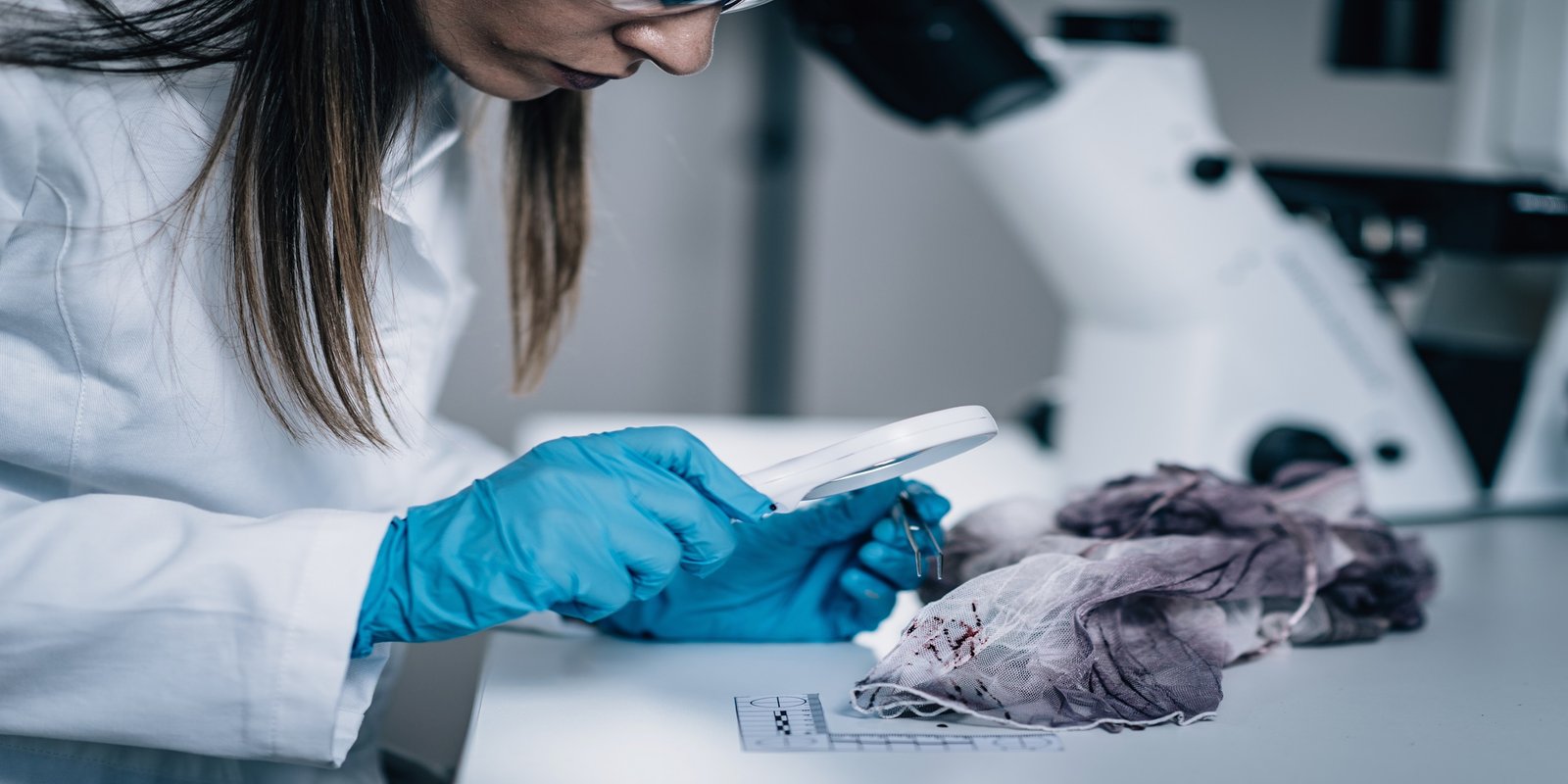No products in the cart.
Have you ever wondered what it takes to solve crimes using science? Becoming a forensic scientist merges the thrill of detective work with the precision of scientific analysis. This unique career offers diverse opportunities in biology, chemistry, and technology.
In this blog, we’ll explore the essential steps to becoming a forensic scientist, from education and training to the key skills required. So, let’s get started on this exciting path towards a career in the pursuit of justice.

What is a Forensic Scientist?
A forensic scientist is a professional who applies scientific principles and techniques to help investigate crimes. Moreover, their work involves analysing physical evidence from crime scenes, such as fingerprints, blood samples, DNA, and other trace materials, to help law enforcement agencies solve cases. Therefore, forensic scientists play an important role in the criminal justice system, providing objective, scientific findings that can be used in court to support investigations and prosecutions.
How to become a Forensic Scientist
Here’s a breakdown of the steps you can follow to become a forensic scientist:
Educational Requirements
High School Preparation
Starting early can make a big difference. If you’re still in high school and dreaming of becoming a forensic scientist, focus on excelling in science and math courses. Subjects like biology, chemistry, and physics are fundamental. Additionally, taking courses in computer science can be beneficial.
Undergraduate Degree
Your journey begins with a solid undergraduate education. Most forensic scientists hold a bachelor’s degree in forensic science or a closely related field such as biology, chemistry, or criminal justice.
Choosing the Right Major
Selecting the right major is mandatory. While forensic science programmes are designed to prepare you for this career, degrees in biology, chemistry, or biochemistry also provide a strong foundation. Ensure the programme you choose includes coursework in forensic applications.
Advanced Education and Certifications
Master’s Degree Options
For those aiming higher, a master’s degree in forensic science or a specialised field can enhance your expertise and job prospects. These programmes delve deeper into forensic techniques and often include research components.
Doctorate Opportunities
While not always necessary, a Ph.D. in a related field can open doors to advanced research positions and academic roles. This level of education is ideal for those who are interested in pushing the boundaries of forensic science.
Necessary Certifications
Certifications can boost your credibility and job prospects. Organisations like the Chartered Society of Forensic Sciences (CSFS) have a list of accredited courses, and it is helpful to select one of these as they show the course has met certain quality standards.

Specialisations in Forensic Science
Forensic Biology
Forensic biologists analyse biological evidence, including DNA, blood, and other bodily fluids. This specialisation is important in identifying suspects and victims.
Forensic Chemistry
Forensic chemists focus on analysing chemical substances found at crime scenes. This can include drugs, explosives, and other unknown substances.
Digital Forensics
In our tech-driven world, digital forensics has become increasingly important. Specialists in this field recover and analyse data from electronic devices.
Forensic Anthropology
Forensic anthropologists study human remains to determine the identity and cause of death. They often work on cases involving decomposed or skeletal remains.
Forensic Pathology
Forensic pathologists are medical doctors who determine the cause of death through autopsies. This specialisation requires extensive medical training.
Gaining Practical Experience
Internships
Internships provide hands-on experience and are an excellent way to apply your academic knowledge. Many forensic science programmes offer internship opportunities with law enforcement agencies or forensic laboratories.
Entry-Level Positions
Starting in an entry-level position, such as a lab technician, can provide valuable experience and a foot in the door. These roles often involve assisting experienced forensic scientists with their investigations.
Volunteer Work
Volunteering can also be a way to gain experience and demonstrate your commitment to the field. Consider volunteering with local law enforcement agencies or community organisations.
How to become a Forensic Scientist: Skills needed
The skills that will make you a professional forensic scientist are:
- Scientific Expertise: This is a no-brainer. Depending on your area of interest, you’ll need a strong foundation in biology, chemistry, toxicology, or even geology.
- Attention to Detail: A keen eye and detailed approach are important from analysing blood spatter patterns to sifting through microscopic evidence.
- Problem-Solving Skills: Every crime scene is a puzzle. Therefore, you’ll need to think critically, research data, and draw logical conclusions from often-limited evidence.
- Communication Skills: Your written reports need to be clear, concise, and defensible in court. You should also be able to explain complex scientific concepts to people from non-scientific backgrounds.
- Patience and Persistence: Lab analyses can be time-consuming, and investigations don’t always yield immediate answers. Perseverance and the ability to stay focused are fundamental.
- Emotional Resilience: Crime scenes can be disturbing. So, you’ll need to maintain professionalism and emotional composure in difficult situations.
- Commitment to Legal Procedures: The evidence you collect and analyse is important in court. Thus, understanding legal protocols and maintaining a chain of custody is important.
- Technological Skills: The field of forensics heavily relies on technology. Therefore, proficiency in relevant software and laboratory equipment is a must.
Day-to-Day Responsibilities of a Forensic Scientist
As a forensic scientist, your daily responsibilities will be diverse and challenging, requiring a meticulous approach to ensure accurate results. Some of them include:
- Collecting Evidence: You will visit crime scenes to collect physical evidence, such as fingerprints, blood samples, and other trace materials. Thus, this requires careful handling to prevent contamination and preserve the integrity of the samples.
- Analysing Samples: In the lab, you’ll analyse various samples using techniques like DNA profiling, chemical analysis, and microscopic examination. Hence, your findings can provide critical insights into a crime and help identify suspects.
- Documenting Findings: Accurate documentation is important. You will record your methods, observations, and results in detailed reports that may be used in legal proceedings. Moreover, clear and thorough documentation ensures that your work can be reviewed and verified by others.
- Collaborating with Law Enforcement: You will work closely with police officers, detectives, and other law enforcement personnel to understand the context of the crime and provide expert advice on the scientific aspects of the investigation.
- Testifying in Court: As an expert witness, you may be called to testify in court about your findings. So, this involves explaining complex scientific concepts in a way that is understandable to judges, juries, and lawyers.
- Keeping Up with Advancements: Forensic science is a rapidly evolving field. Thus, staying up-to-date with the latest techniques, technologies, and research is essential. This may involve attending conferences, participating in training sessions, and reading scientific literature.
- Ensuring Quality Control: Maintaining high standards of quality and accuracy is vital. You will implement and follow strict protocols and procedures to ensure the reliability of your results.
How much does a forensic scientist make?
The salary of a forensic scientist in the UK can vary based on factors such as experience, qualifications, and the specific sector of employment. On average, entry-level forensic scientists can expect to earn between £20,000 and £30,000 per year. However, with increased experience and specialisation, salaries can rise significantly.
Mid-level forensic scientists typically earn between £30,000 and £40,000 annually. Those in senior positions or with substantial experience and expertise may earn upwards of £45,000 to £60,000 per year. In some cases, especially within specialised roles or high-demand areas, salaries can exceed these ranges.
Additionally, forensic scientists employed by private firms or working as consultants may have the potential to earn higher salaries compared to those in public sector roles. Overall, a career in forensic science in the UK can be financially rewarding, especially for those who advance to senior or specialised roles.
Ready to Take the Next Step?
Finally, the last step for you to do is to research forensic science courses offered by reputable institutions. Moreover, you should consider your preferred learning style, course duration, and career goals. You can also check out the Wise Campus, and we also offer high-quality forensic science courses at the absolute lowest price compared to other providers, which is almost free.
Therefore, by enrolling in and pursuing our forensic science, you’ll be well on your way to becoming a valuable asset to the forensic sector!







